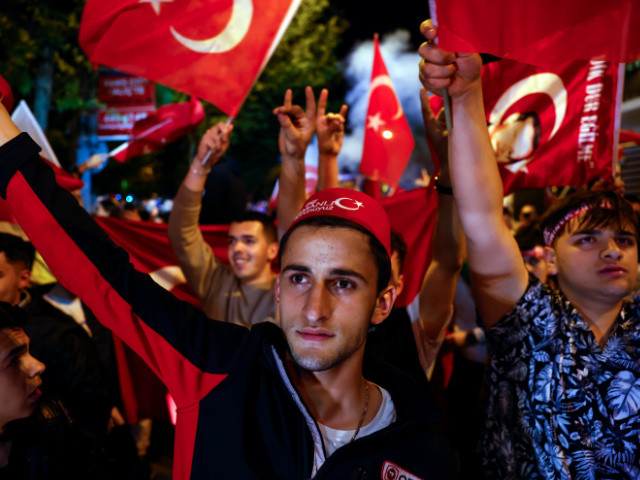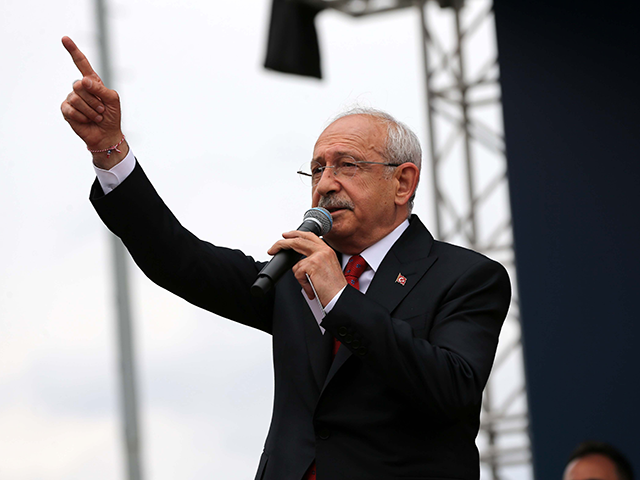Turkish nationalist presidential candidate Sinan Ogan, who finished in third place with 5.2 percent of the vote in the May 14 presidential election, announced on Monday that he will throw his support behind incumbent President Recep Tayyip Erdogan in the May 28 runoff election.
Erdogan finished in first place on May 14 with 49.5 percent of the vote, surprising observers who thought challenger Kemal Kilicdaroglu was the favorite to win based on polling and public discontent with Erdogan after two decades in power.

Supporters of Turkish President Recep Tayyip Erdogan celebrate at the AK Party headquarters on May 14, 2023 in Istanbul, Turkey. (Jeff J Mitchell/Getty Images)
Kilicdaroglu ran about five points behind Erdogan on election day, but since Erdogan did not clear the necessary 50 percent threshold to avoid a runoff, the two will face off at the ballot box again on May 28.
Ogan was seen as a kingmaker with his 5.2 percent of the vote, a role he evidently relished until making up his mind to support Erdogan. Ogan said he chose to back the incumbent because he believes Erdogan is tougher on terrorism, enjoys a parliamentary majority, and will take “all the measures for sending the immigrants [home] in a certain timeline.”
“I also want to emphasize that I never negotiated for any position with either of the alliances,” Ogan added at a press conference on Monday.
Sinan Oğan to support Erdoğan in runoff pollshttps://t.co/QDRWjn9ndk pic.twitter.com/ZhpFpHoiqo
— Hürriyet Daily News (@HDNER) May 22, 2023
Ogan held a surprise meeting with Erdogan in Istanbul on Friday. Neither of them held a press conference afterward or revealed what they discussed during their one-hour meeting, leading to broad speculation that Erdogan promised Ogan whatever was needed to secure his endorsement.
Kilicdaroglu has been running hard to scoop up Ogan’s voters, shedding some of his mild secularist image to present himself as the candidate most likely to repatriate the large number of refugees living in Turkey, most of them from Syria. Last week, Kilicdaroglu accused Erdogan of secretly plotting to flood Turkey with even more “irregular migrants.”
Ogan evidently was not persuaded by Kilicdaroglu’s anti-migrant stance, but some members of his former political alliance might be.
Vecdet Oz, chair of the Justice Party, said on Monday that the ATA Alliance which backed Ogan has “officially ended” and “every party will make its own decision.”
“Sinan Ogan can act the way he wants,” said Oz, as he announced his own support for Kilicdaroglu.

Kemal Kilicdaroglu, the leader of the Republican People’s Party (CHP) and the joint presidential candidate of the Nation Alliance greets the crowd at an electoral rally organized by CHP in Sivas, Turkey, on May 11, 2023. (Serhat Zafer/Anadolu Agency via Getty Images)
Another member of Ogan’s coalition, Umit Ozdag of the Victory Party, said that Ogan’s support for Erdogan was “his own political choice.”
Ozdag said Ogan “does not represent the Victory Party and does not bind the party.” He promised his own endorsement for the runoff election would be announced on Tuesday.
Ogan’s other big issue, terrorism, is largely a code word for “the Kurds.” Ogan said he could not support Kilicdaroglu unless he came out strongly against the PKK, the violent Kurdish separatist group highlighted as Turkey’s primary security concern by Erdogan.
Kilicdaroglu has carefully courted support from pro-Kurdish parties, mindful that getting too close to any Kurds could cause members of his own political coalition to bolt because they tend to think every Kurdish political and militia entity in Turkey, Syria, and Iraq is linked to the PKK.
Erdogan’s campaign circulated a video during the campaign that portrayed Kilicdaroglu as secretly in league with the PKK. Kilicdaroglu said the video was doctored, denounced Erdogan as a “manipulative charlatan,” and said he was tired of being “falsely accused.” Erdogan admitted after the election that the video might have been “manipulated.”
After the runoff election campaign began, Kilicdaroglu said he would not engage in peace talks with the PKK if he was elected, making an effort to placate the nationalists without completely alienating his Kurdish supporters.
Erdogan also accused Kilicdaroglu of supporting FETO, the Turkish government’s name for the followers of onetime Erdogan ally Fethullah Gulen, a Muslim cleric who now lives in exile in the United States. Erdogan blames the Gulenists for masterminding the alleged 2016 coup attempt against him.
In response, Erdogan launched a purge that pushed thousands of alleged Gulen supporters out of government jobs and landed many of them in jail. Kilicdaroglu has criticized the purge as excessive and accused Erdogan of using the FETO threat as an excuse to jail his political opponents, including journalists and academics.
Kilicdaroglu, in turn, has accused Erdogan of being in league with the Gulenists. More specifically, Kilicdaroglu blames Erdogan for allowing so many Gulen supporters to allegedly infiltrate the Turkish government and rise to power, back when Erdogan and Gulen were allies, and he claims FETO still has a secret political wing inside Erdogan’s AKP party. The years-long feud between Erdogan and Kilicdaroglu over the Gulenists has resurfaced once again in the runoff election.
Turkey’s election board, the Supreme Election Council (YSK), said on Tuesday that about 1.5 million Turkish citizens living abroad have already cast absentee ballots for the runoff election. The YSK said long lines have been reported at Turkish consulates in Europe where large populations of Turks can be found, especially Germany, France, and the Netherlands.
According to YSK, over 1.8 million Turkish citizens living overseas voted in the May 14 election, giving them a participation rate of 52.6 percent. Turnout within Turkey reached a record level of almost 89 percent.


